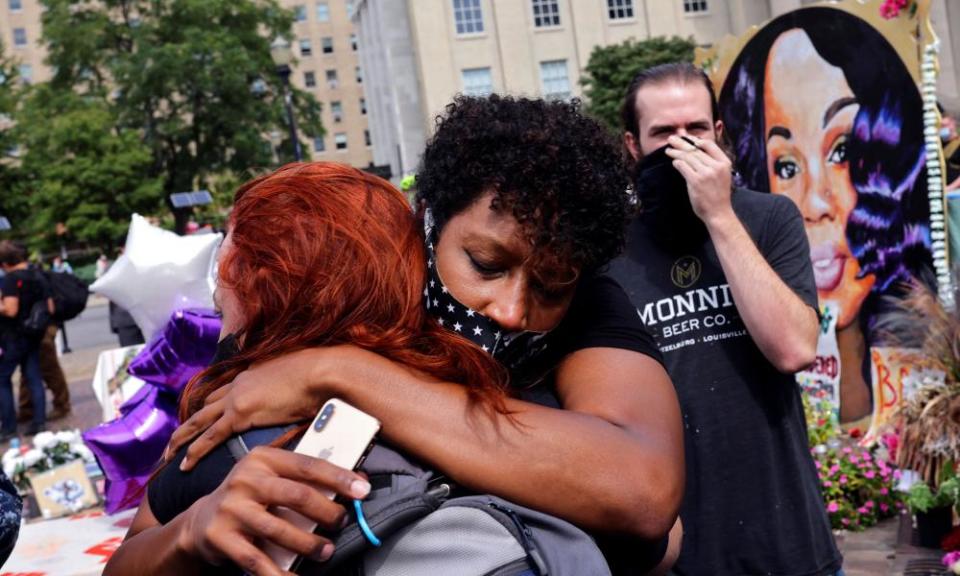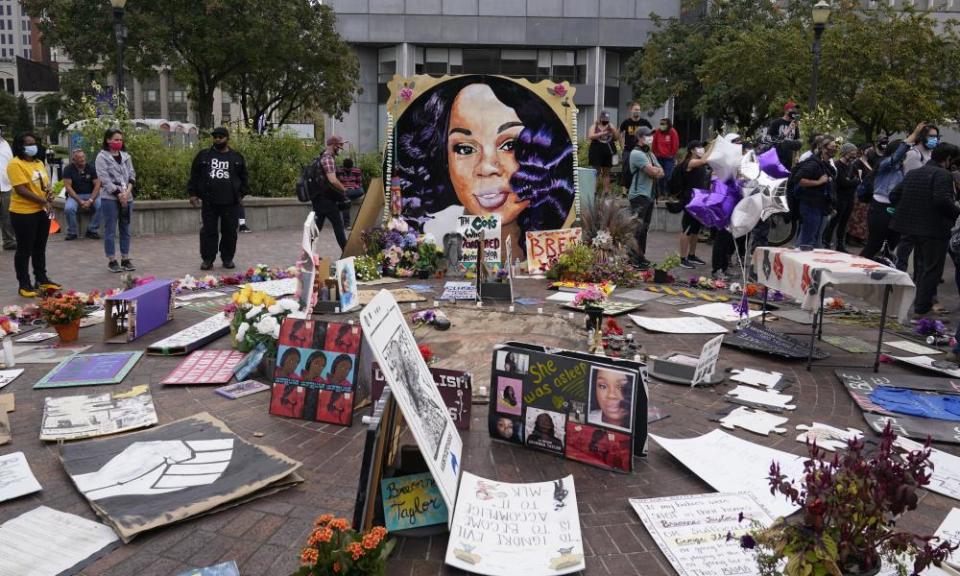‘This city is hostile’: protesters despair for justice in Breonna Taylor killing

For nearly 120 days, protesters in Louisville, Kentucky, have shouted “no justice, no peace!” as they called for charges against three police officers involved in the killing of Breonna Taylor, a 26-year-old Black woman who was shot in her apartment in March as police executed a search warrant.
In the minutes following the announcement that only one officer would be indicted – for wanton endangerment for firing into an apartment next door to Taylor’s – a quiet, stunned sadness and simmering anger overtook Louisville’s Jefferson Square Park, the epicenter of protests which has been dubbed Injustice Square Park.
Monique Lathon, a 33-year-old Black woman, said she was feeling “mostly sadness more than anger” as tears streamed down her face after the announcement. “Just sorry to Bre that we weren’t able to get her justice.”
Related: Breonna Taylor: crowds march after grand jury refuses to charge officers in killing

On the edge of the square, David Mour, a 59-year-old attorney who is a fixture at demonstrations and represents many protesters, was wearing body armor.
“People say they fear for our city. I don’t fear for our city. I fear for our people,” he said. “We can rebuild buildings, we can fix broken windows, we can wash off graffiti, but we can’t heal broken hearts. We can’t heal broken spirits – and that’s what we’ve got.”
Mour said he’d “had clients indicted for way less evidence than they had to indict these guys”.
Taylor was killed when officers executing a so-called “no-knock warrant” burst down her apartment door as part of a narcotics investigation targeting her ex-boyfriend, who was arrested 10 miles across the city in a raid carried out at about the same time. As police breached Taylor’s door her boyfriend Kenneth Walker fired off a shot from his handgun, thinking he was witnessing a home invasion. Taylor, who was unarmed, was killed as police responded with gunfire, some of which poured in from a window around the corner from where officers had tried to enter the apartment. No drugs or drug money were found in the residence.
The officer who was charged on Wednesday, Brett Hankison, had been fired from the police force in June for his actions the night Taylor was killed. The acting chief of police wrote that Hankison displayed “an extreme indifference to the value of human life” when he “wantonly and blindly” fired 10 shots into Taylor’s apartment on 13 March. He was booked in jail on Wednesday but released on bail about half an hour later.

Last week, the city of Louisville paid $12m to Taylor’s estate to settle a lawsuit and announced a number of additional reforms that would come to the police department. Hankison’s firing, the settlement and the promised reforms were all heralded as victories and promising signs by protesters in this segregated city. But what happened on Wednesday felt like a step back to many, as though change wasn’t possible.
“I don’t think I’ll live to see it. I have grandchildren and I’m skeptical to say they will witness it,” said Solderick Ware, a 46-year-old Black steel worker, when asked whether he thought Black residents of Louisville and the United States could have more equality and equity.
Ware was sitting outside at a taco restaurant with some friends in the Highlands, an affluent neighborhood where protesters had marched following the announcement, leaving the barricaded streets and boarded-up windows of the city center behind.
In the Highlands, protesters yelled, “How do you spell racist? L-M-P-D,” – a reference to the Louisville Metro Police Department. One woman shouted, “Are you a parent?” at police vehicles that drove by.
Police in riot gear confronted protesters at one intersection, standing in phalanx with batons beneath a bucolic mural of a local park. Clashing with protesters at one point, officers could be observed firing pepper balls, which dispense a chemical irritant. A number of protesters were taken into police custody.
After the situation in the Highlands calmed, Shawn Anderson, 45, was sitting with Ware and wearing a shirt that showed Taylor alongside George Floyd and Ahmaud Arbery – a trio of Black Americans whose deaths have driven racial justice protests across the nation. Anderson’s mask was covered in photos of Taylor, including one of her in an EMT uniform.
That Kentucky attorney general Daniel Cameron, a Black man, could not file more charges in the death of a Black woman killed by police was “sickening”, he said. “It makes no sense.”
“One day he’s going to have to answer for all the blood on his hands because he knows in his heart that it’s unjust and it’s wrong,” he said. “God has the last say. So we can protest. We mad. We upset. But his day is gonna come, just like all of us, our day is gonna come. And that’s when he gonna meet his justice.”
Deziree Edwards, 21, was driving on the highway towards the protest square on Wednesday afternoon when she learned of the decision while watching a livestream.
She said it was disappointing, but somewhat expected.
“I definitely believe that change is due because this is not the system that I deserve to live in,” she said. “This is not the system that we deserve to live in. This city is hostile.”

